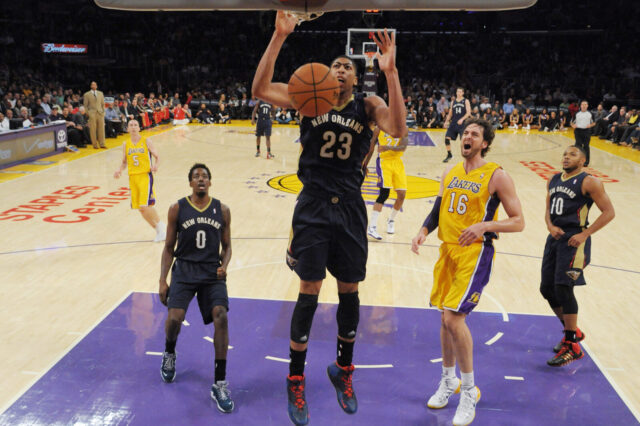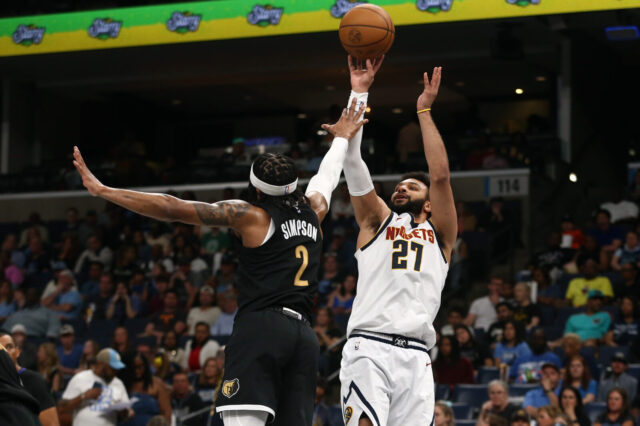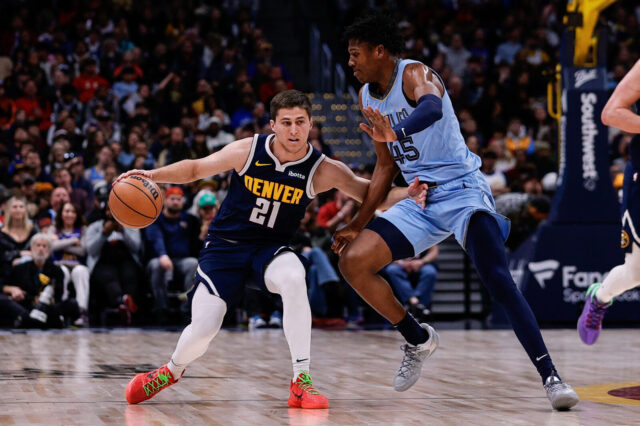“He’s a poor defender.”
“He isn’t aggressive enough.”
“He needs to be in better shape.”
These are some of the common criticisms of Denver Nuggets superstar center Nikola Jokic. They are also some of my least favorite comments about the Serbian big man because they come from a place of misinformation. It’s what many want to believe, but it’s time for them to see the reality. Nikola Jokic is a good defender, he’s properly aggressive for his role on the team, and his fitness didn’t prevent him from playing 65 minutes in the 90th game of his season.
The most interesting part of the discussion surrounding Jokic is why these stigmas surround such a great young player.
What Jokic appears to be
Here is a picture of an All-NBA First Team center.
This content is no longer available.
Here is a picture of an All-NBA Second Team center.
This content is no longer available.
It’s undoubtedly easier for many fans to understand and appreciate Joel Embiid as a dominant center. He has the build, the muscle definition, and the face of a true competitor on the basketball court. At times, it appears that Jokic is competing with himself to make some of the most unflattering faces on an elite player in basketball history, truly an uncanny talent. So much of the social media age in today’s basketball landscape surrounds appearance, and Embiid, popular on Twitter, in commercials, and generally outspoken and hilarious, appeals heavily to that demographic. Jokic, a more reserved individual who avoids the spotlight if he can, stays away from many of the outlets that help young players gain popularity. Although, he did appear in an amazing Serbian commercial.
It’s this goofy side that helps fans relate to Jokic and want to be his supporters. Once he’s comfortable, he’s extremely funny. Many Nuggets players have listed him as one of the funniest players on the team. He makes funny faces at the camera, jokes around with Nuggets equipment manager Sparky Gonzales, throws the ball off opponents out of bounds, and is extremely animated while on the court. This can rub some people the wrong way, some who want him to showcase “Mamba Mentality” or other stereotypical ideals of being a competitor, but that’s just not who he is, and that’s okay.
Here’s how Jokic responded when asked how he recovered from the Game 3 quadruple overtime loss to the Portland Trail Blazers in the second round last year to win Game 4 (7:15 mark):
“For me, I eat good, I watch TV show, then I eat good again, sleep and to be honest I didn’t think about [Game 3] all day.”
This is classic Nikola. Lighthearted and down to earth. Relatable and honest when comfortable with the situation. As he continues to grow in stature in the NBA today, the rest of the world will see him for the person he is and that none of the physical traits unrelated to basketball truly matter when evaluating how well players play basketball.
The unique nature of Jokic’s skill set
While Jokic technically plays center for the Nuggets, identifying him as just a center limits the scope of who he is as a player. In truth, he’s a 7’0 point guard masquerading in the body of a center, and that distinction has value when evaluating his performance.
While his per game averages last season of 20.1 points, 10.8 rebounds, and 7.3 assists hold him in high regard as a center, they hold him in an even higher regard as a point guard. Six qualified players averaged over 20 points and 10 rebounds per game: Jokic, Giannis Antetokounmpo, Joel Embiid, Karl-Anthony Towns, Nikola Vucevic, and Russell Westbrook. And yet, only four players averaged 20 points and 7 assists per game: Jokic, Westbrook, James Harden, and Jrue Holiday. Jokic and Westbrook appearing on both lists showcases their unique skillsets, and Jokic becomes even more exemplary when comparing his shooting efficiency to a player like Westbrook (58.9 True Shooting % for Jokic compared to 50.1 for Russ).
Jokic is truly in a league of his own when it comes to unique characteristics. LeBron James popularized the term point forward as he ran the offenses for the Cleveland Cavaliers and Miami Heat during the first 15 years of his career. Jokic captains the offense in a similar way in Denver, taking opponents off the dribble, playmaking from the post, and even running pick and roll with Jamal Murray, his point guard.
The world has never seen a true point center before, and because of that, many people have a difficult time understanding why he does and doesn’t do certain things on the basketball court. Instead of treating him like a center who runs the offense, treating him like a point guard who defends centers offers an entirely different perspective. Jokic is asked to generate many shots for the Nuggets, especially in playoff situations. Him not being an elite defender affects his overall impact slightly more than a player like James Harden or Stephen Curry not being an elite defense, but those players are consensus top 5 players in the NBA today and Jokic operates in a similar way offensively to both. Not quite at that level but growing ever closer.
The steps Jokic took as a defender last season
The team numbers don’t reflect as large of an individual defensive improvement from Jokic, but his individual numbers across the board reflect higher effort and defensive acumen. His individual defense in a variety of categories has improved from year to year, starting with his defensive play type statistics generated by Second Spectrum:
This content is no longer available.
In every instance, Jokic improved on a points per possession basis. Teams attacked him less and less throughout the year as he displayed a stronger penchant for defense in his fourth season. Certain teams were able to exploit his weaknesses, from James Harden and the Houston Rockets to the monster that is the Golden State Warriors, but fewer of those teams exist today that Jokic hasn’t been impactful against. His ability to play up on ball handlers in the pick and roll and cause turnovers, alter passes, and force guards to pick up their dribble has helped Denver improve their defense as a whole.
Jokic’s higher Defensive RPM also reflects an improvement via the numbers. While his RPM dropped in 2017-18, it crept back into the top 30 overall this year, next to players like Al Horford, Aron Baynes, Willie Cauley-Stein, and Bam Adebayo.
He may never be an All-Defensive type, but again, viewing him through the lens of other point guards makes that more palatable. As long as the Nuggets can continue surrounding him with defensive talent and length, there should be no reason that Jokic can’t be the starting center on a championship caliber team. He defends in a different way than standard defensive centers, but once again, getting the job done in an abnormal way has contributed to a negative public opinion of his defensive game, despite being good in many situations.
Because he doesn’t look like the normal superstar, it has taken awhile for the NBA world to treat Jokic like a superstar. That being said, it’s undeniable the impact he has had in the first four years of his career. 10 total players have accumulated over 20.0 in Basketball Reference’s Value Over Replacement Player (VORP) in the first four seasons of their careers:
- Michael Jordan – 29.4 VORP
- David Robinson – 29.4
- LeBron James – 29.0
- Chris Paul – 28.2
- Charles Barkley – 27.0
- Larry Bird – 25.4
- Magic Johnson – 23.8
- Grant Hill – 21.9
- Tim Duncan – 21.3
- Nikola Jokic – 21.2
- Honorable Mentions: Shaquille O’Neal, Hakeem Olajuwon, Karl-Anthony Towns
That is quite the star-studded list and supports that even for a team that missed the playoffs for three of the first four years of his career, Jokic was still able to have a tremendous impact on winning. He did it in an abnormal fashion, but he became a top 10 player by doing a bunch of weird stuff anyway. Maybe it’s time to lean into the weirdness and show the NBA world what Nikola Jokic is truly capable of.
Spoiler alert: it’s greatness.


